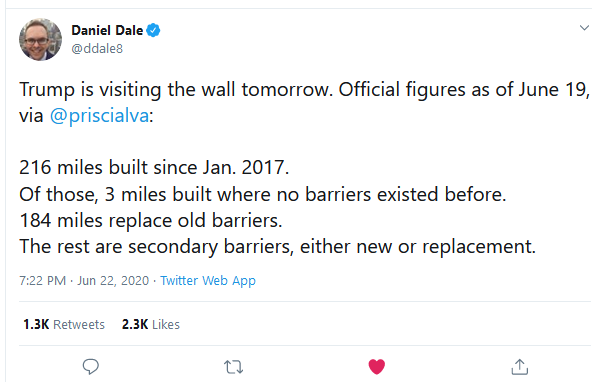“Now that the very expensive, unpopular and unfair Individual Mandate provision has been terminated by us, many States & the U.S. are asking the Supreme Court that Obamacare itself be terminated so that it can be replaced with a FAR BETTER AND MUCH LESS EXPENSIVE ALTERNATIVE… Obamacare is a joke! Deductible is far too high and the overall cost is ridiculous. My Administration has gone out of its way to manage OC much better than previous, but it is still no good. I will ALWAYS PROTECT PEOPLE WITH PRE-EXISTING CONDITIONS, ALWAYS, ALWAYS,ALWAYS!!!”
— President Trump, in a pair of tweets , June 27, 2020
Just as the number of weekly coronavirus cases reached a new high in the United States, the Trump administration filed a legal brief asking the Supreme Court to strike down the entire Affordable Care Act.
About 20 million people covered through the act could lose their health insurance if Trump succeeds, among many other consequences bearing directly on the U.S. response to the coronavirus pandemic.
Key provisions of the health-care law prohibit insurers from denying coverage to people who are already sick, or who have “preexisting conditions.”
Trump has claimed nearly 100 times since he took office that he will “always protect people with preexisting conditions,” but the legal brief filed by the Justice Department last week belies the president’s claim. It says point blank that the entire Affordable Care Act — including its coverage guarantee for people with preexisting conditions — “must fall.”
The Facts
Republicans for a decade have tried to repeal the Affordable Care Act signed by President Barack Obama in 2010. The Supreme Court has upheld the law twice in the face of legal challenges from conservative groups.
A new challenge brought by a group of Republican state attorneys general is now pending before the court. The Justice Department filed a brief June 25 in support of the GOP argument that “the entire ACA … must fall.”
Before the Affordable Care Act, insurance companies could consider a person’s health status when determining premiums, sometimes making coverage unaffordable or even unavailable if a person was already sick with a problem that required expensive treatment.
The act prohibited this practice through two provisions: “guaranteed issue,” which means insurance companies must sell insurance to anyone who wants to buy it, and “community rating,” which means that people within the same geographic area who buy similar insurance and are the same age pay similar prices. The two together made insurance affordable for people with, say, cancer. Before Obamacare, even minor health problems could have led an insurance company to deny coverage.
The Affordable Care Act also established online health insurance marketplaces and subsidies for participating buyers, gave states the option to expand their Medicaid programs primarily with federal funding, and imposed a financial penalty known as the “individual mandate” on people who did not have coverage during a given year.
Trump and the Republican-controlled Congress reduced the individual mandate’s penalty to zero in late 2017 as part of the Tax Cuts and Jobs Act, nullifying but not repealing that section of the law. A federal appeals court ruled in December that the individual mandate, already down to zero, was unconstitutional.
Now, the GOP state attorneys general argue that Congress meant to repeal the entire Affordable Care Act when it reduced the mandate to zero. The same argument appears in the Justice Department’s brief, signed by Solicitor General Noel J. Francisco.
“Even though the guaranteed-issue and community rating provisions are constitutionally valid when standing on their own, it is evident that Congress would not ‘have wanted’ them to stand without the individual mandate,” Francisco wrote. “That these provisions are inseverable is evident from the enacted text of the ACA, where Congress expressly found that the individual mandate is essential to the operation of the guaranteed-issue and community rating provisions.”
Some Republicans say the Trump administration’s official legal position is flimsy and ill-advised.
Sen. Lamar Alexander (R-Tenn.), chairman of the Senate health committee, said he was disappointed Trump decided to press the case. “I thought the Justice Department argument was really flimsy,” Alexander said last month on “Meet the Press.” “What they’re arguing is that when we voted to get rid of the individual mandate, we voted to get rid of Obamacare. I don’t know one single senator that thought that.”
“Congress had the opportunity to strike other provisions and chose not to,” said Sen. Susan Collins (R-Maine), who is in a close race for reelection this year and opposes the Republican lawsuit.
The Washington Post reported last year that House Minority Leader Kevin McCarthy (R-Calif.) urged Trump “to hold off on pushing for a court-ordered destruction of the ACA, advice the president ignored.”
“McCarthy has complained privately to donors that the last GOP attempt to gut Obamacare — including its most popular provisions, such as protections for preexisting conditions — was the main reason the party lost at least 40 House seats” in the 2018 midterms, The Post reported.
Attorney General William P. Barr, according to CNN, tried to get the White House to back off from pursuing a full rollback of the Affordable Care Act but was unsuccessful.
“The ACA remains in effect while the litigation is pending,” according to the Kaiser Family Foundation. “However, if all or most of the law ultimately is struck down, it will have complex and far-reaching consequences for the nation’s health care system, affecting nearly everyone in some way. A host of ACA provisions could be eliminated, including protections for people with preexisting conditions, subsidies to make individual health insurance more affordable, expanded eligibility for Medicaid, coverage of young adults up to age 26 under their parents’ insurance policies, coverage of preventive care with no patient cost-sharing, closing of the doughnut hole under Medicare’s drug benefit, and a series of tax increases to fund these initiatives.”
Trump told The Post days before his inauguration in January 2017 that he was nearly done with his plan to replace Obama’s signature health-care law. Three and a half years later, no replacement plan has emerged from the administration. It would be an enormous undertaking. The health-care industry accounts for roughly one-sixth of the U.S. economy. The Affordable Care Act is a sprawling piece of legislation with deep roots after 10 years.
Republicans hardly agree on what a replacement for Obamacare would look like — or how to preserve the protections for preexisting health conditions. “I spent 6 months of 2014 working on a replacement, every single day, with staff and the 4 committee chairs of jurisdiction. We could not even put together a white paper,” Republican consultant Doug Heye wrote on Twitter.
Before he asked the nation’s highest court to strike down the law, Trump consistently sought to weaken some of the Obamacare provisions at issue, as we found in this fact check.
The president threw his support behind House and Senate bills that would have weakened the guaranteed issue and community rating protections by allowing states to seek waivers and consider a person’s health status when writing policies in the individual market. The theory was that removing sicker people from the markets and allowing policies with skimpier options would result in lower overall premiums.
But the Congressional Budget Office concluded that states that took advantage of these provisions could perversely end up blowing up their insurance markets, leaving people with preexisting conditions with spiraling costs. About one-sixth of the U.S. population was estimated to live in states that would face this problem.
The Trump administration also has issued new rules that promote the use of low-quality, short-term plans that were prohibited under Obamacare. These plans typically don’t have the same protections for people with existing health conditions, allowing insurance companies to deny coverage or charge higher prices. (A number of states, mainly Democratic-leaning, have acted to prohibit or limit these Trump plans.)
The Pinocchio Test
Trump says he will always protect people with preexisting health conditions who need to buy affordable insurance. But what is he actually doing with the powers of the presidency?
In the middle of a pandemic, against the advice of many Republicans, the president is asking the Supreme Court to strike down the entire Affordable Care Act — including its coverage guarantee for patients with preexisting conditions.
Trump has offered no plan to replace these, or any, provisions of the law. He has supported legislation to water down protections for people with preexisting conditions, and his administration has issued new rules promoting plans that allow insurance companies to deny coverage or charge higher prices to sick patients.
In addition to being a Four Pinocchio claim, this is a Bottomless Pinocchio — our worst rating — because Trump has repeated the falsehood more than 20 times. In fact, he’s nearing 100 repetitions. In our new book, “Donald Trump and His Assault on Truth,” we labeled this one of Trump’s top 10 whoppers.
Four Pinocchios
Note: This is MY version of the Bottomless Pinocchio graphic.













